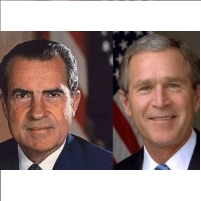Secret Bush Memos Released...And the Ones Still Hidden
Tuesday, March 03, 2009

The Justice Department publicly released nine highly controversial legal opinions, kept secret until now, which gave George W. Bush unchecked powers during his “war on terror.” The contents reveal that the Bush administration took the position best summarized by Richard Nixon on May 19, 1977: “When the president does it, that means that it is not illegal.”
The collection of memos, written by the Justice Department’s Office of Legal Counsel (OLC), are the legal justifications for the Bush administration’s controversial antiterrorism policies, including its policies on detentions, interrogation techniques and warrantless searching and surveillance.
In one of the most controversial of the newly released opinions, entitled “Authority for Use of Military Force to Combat Terrorist Activities Within the United States,” former agency attorney John Yoo concluded that the fourth amendment, ensuring free speech and protecting persons from warrantless searches, does not apply to “domestic military operations designed to deter and prevent future terrorist attacks.” Yoo also wrote that because of “the overriding need to wage war successfully,” Bush could put restrictions on freedom of the speech and freedom of press. This memo was dated October 23, 2001.
In another memo, dated March 13, 2002, Jay Bybee, the OLC’s former assistant attorney general, declared that Bush had the authority to transfer detainees to other countries known to commit human rights abuses so long as the U.S. did not, “explicitly or implicitly,” intentionally seek their torture.
In a memo from November 15, 2001, relating to the Anti-Ballistic Missile Treaty with the Soviet Union/Russia, Yoo argued that the president could unilaterally suspend foreign treaties under the claim that the powers of the Chief Executive give him constitutional rights to do so.
Although the public release of these legal opinions is a crucial first step towards understanding some of the flawed and possibly illegal policies of the Bush administration, the most controversial memos, concerning the authorization of illegal interrogation techniques, still remain secret.
Here are a few of the still-secret memos:
11/20/01 - Laws and treaties regarding treatment of prisoners (from John Yoo and Robert Delahunty to Alberto Gonzales)
1/14/02 - The War Crimes Act's application to American interrogators (from John Yoo and Robert Delahunty to William Taft, IV)
1/24/02 - Options for interpreting the Geneva Conventions (from John Yoo to Alberto Gonzales)
7/22/02 - Convention Against Torture has limited application in the U.S. (from John Yoo to Alberto Gonzales)
6/1/03 - Approval of CIA interrogation techniques (from The White House to George Tenet)
-Aaron Wallechinsky
Post-9/11 Memos Show More Bush-Era Legal Errors (By R. Jeffrey Smith and Dan Eggen, The Washington Post)
In Legal Memos, Clearer View of Power Bush Sought (By Neil A. Lewis, New York Times)
Yoo Memo Said Bush Could Limit Freedom of Speech During Wartime (By Jason Leopold, The Public Record)
Office of Legal Counsel (AllGov)
- Top Stories
- Unusual News
- Where is the Money Going?
- Controversies
- U.S. and the World
- Appointments and Resignations
- Latest News
- Trump to Stop Deportations If…
- Trump Denounces World Series
- What If China Invaded the United States?
- Donald Trump Has a Mental Health Problem and It Has a Name
- Trump Goes on Renaming Frenzy






Comments